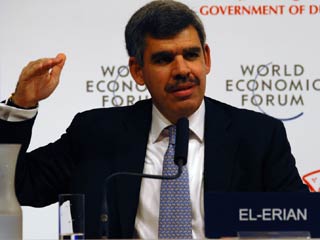
PIMCO CEO Mohamed El-Erian Source: Google Images
Thank God he does!
Earlier this week I wrote a piece (click here) about money men who don’t understand country risk writing investment letters prescribing economic policy to the US government. Bill Gross, founder of mega-bond fund, Pacific Investment Management Co. (PIMCO) out of sunny Newport Beach CA, criticized the Federal Reserve and its policy of quantitative easing — an effort to push liquidity into the market in order to lower long-term interest rates and support our fragile economy (read here). His contortions allowed him to at once call QE a “Ponzi scheme” and offer it his qualified support. One of Gross’s birds of a feather is Jeremy Grantham, founder of a mega-asset manager of the same name, who was even more scathing in his attack on the Fed (read his irresponsible investment letter here). I used to visit both firms as a country risk analyst, explaining the economic ups and downs of emerging markets. Gross and Grantham never attended, but El-Erian did. I was impressed by the latter’s understanding of the global economy, though he always held his analytical cards close. Today, in speaking with CNBC, El-Erian seemed to contradict his boss. He seems to think Fed policy may be doing some good. El Erian said:
“The Fed is very active, but nobody else is on the policy side so we’re not seeing enough to promote growth, to create jobs, and we’re not seeing that balance between short-term fiscal stimulus and medium-term financial discipline.” Kind of what I said in my earlier post.
I also said about Gross and Grantham:
“Didn’t these wealthy guys study the central policy lesson of Japan’s lost decade of the 1990s, that its central bank failed to act quickly enough with an unorthodox monetary policy to counter noxious deflationary pressures? Didn’t they study the Great Depression, as Chairman Bernanke has? Deflation is one of the worst things that can happen to an economy. Debtors owe a certain amount, but the price of their goods (or their labor) falls making it difficult for them to service their debts. Widespread defaults occur and the economy contracts. Unemployment rises (to around 25% in the Great Depression vs. under 10% today). As long as debtors pay their debts, creditors, such as Gross and Grantham, can reap real profits. Maybe that’s why they wrote their silly investment letters. Trouble is, with deflation, debtors can’t pay and ultimately, the short-sighted Gross and Grantham suffer too. Deflation is scary and preventing it well worth the risk of taking unorthodox measures, anathema to bond investors. Unorthodox because the central bank is attempting to directly influence long-term interest rates, which can backfire if inflation ticks up. But that backfiring means a little more inflation in the short run, which can be countered later on, even though it means lower real profits for PIMCO. “
Ole Gross and Grantham may have an investment track record, but their understanding of macroeconomic policy and the history of financial crises pales in comparison with some of my students of International Political Economy. For that reason, in my last post, I ended with, “…tell the money men in Newport Beach or elsewhere to keep quiet in their corner offices.” A lot goes into determining long-term interest rates (inflation expectations, credit risk, liquidity), but Gross and Grantham’s paranoia of late may have had something to do with the 70 basis point rise at the very long end of the curve over the last month.